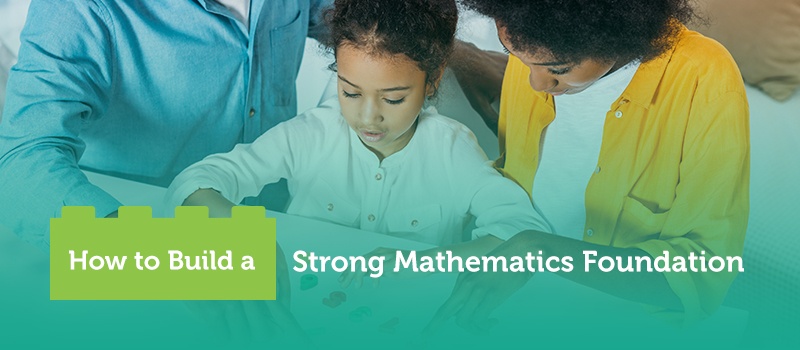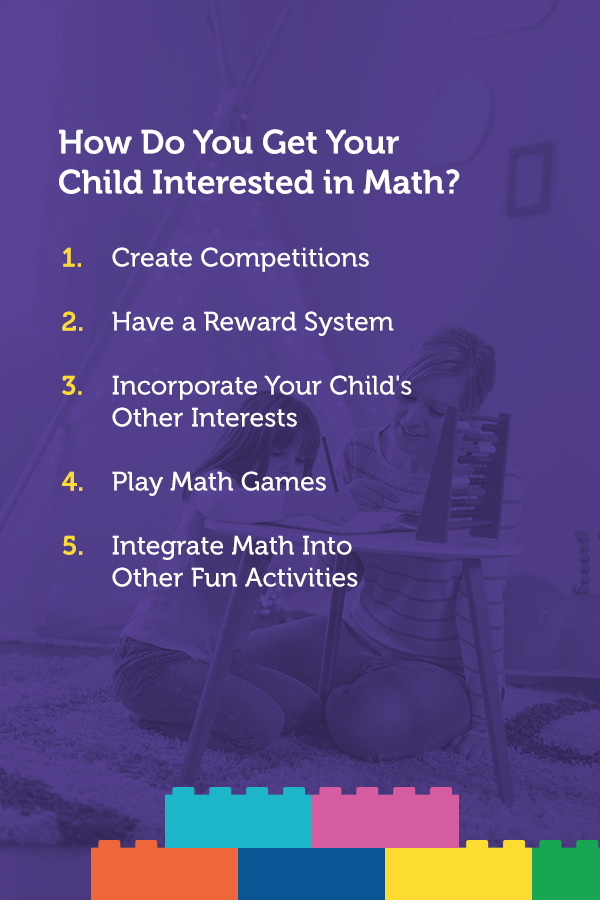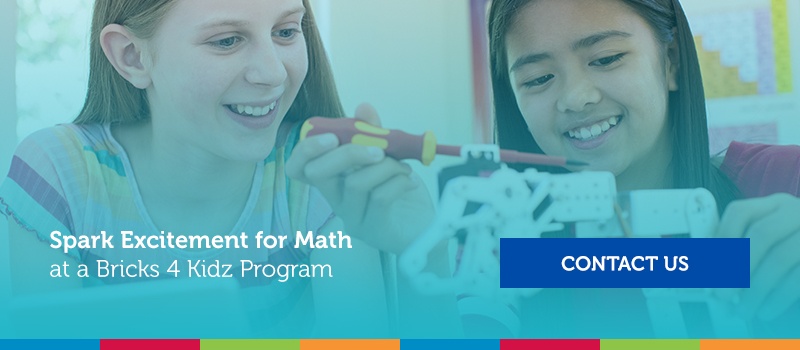
Children get excited about a lot of things. Sweet treats, a new toy, play dates with friends, watching one more episode of their favorite show — finishing their math homework.
Maybe being eager to do math homework is a stretch, but many tips for developing and building math skills at home will get your child excited about math. A sturdy math foundation starts at school, but it’s equally essential for you to continue that learning at home
Why Is Math Important for Kids to Learn?
Math is more than shapes and numbers. It’s relationships, organizational skills, cause and effect, approximation and other crucial developmental thought processes.
People who are good at math are thinkers. Of course, that doesn’t mean other people aren’t, but children who practice active math learning are statistically:
- More motivated
- More attentive
- Faster at processing information
- Better at accessing memory
Unfortunately, there is a stigma that math has a steep learning curve or should make people anxious. Learning anything for the first time can feel daunting. This prejudice comes down to an educational misstep, where a poorly built mathematical foundation sends students tumbling down into the world of disliking math.
By teaching kids robust math skills, you’re supporting their future love of learning and avoiding the “math anxiety” stigma.
What Are Foundational Math Skills?
When we say “foundational math skills,” we mean:
- Counting concrete objects
- Comparing numbers using <, > and =
- Understanding place value
- Knowing basic addition and subtraction
- Knowing simple multiplication and division
- Understanding fractions
Younger children likely won’t immediately grasp the relationship between numerators and denominators. But, they’re going to practice other developmental skills like one-to-one correspondence, identifying which group of objects is smaller or larger, counting by 1 and so on.
The mathematical skills children learn, even before kindergarten, influences their learning ability later in their educational careers. Math concepts build, growing from foundational skills to algebra, functions, modeling, geometry, up to calculus topics of integration, differentiation and beyond.
If you want your child to embrace the benefits of math, help them build a robust foundation that lets them progress to these higher mathematical topics through high school, college and potentially into a STEM career.

Understanding How Your Child Learns
If you’re trying to teach a child the fundamental parts of a flower — the petal, stem, leaf, sepal, etc. — how would you do it? Would you break out a diagram, recite textbook definitions and hope something sticks? Probably not.
Instead, you would give them a flower and let them dissect it. Why? Because children learn by doing.
While they dissect, let them talk through the different parts of the flower they see. As they discover, you’re there to help guide their learning and solidify their knowledge. The same goes for learning math concepts.
Approaches to Learning
“Doing” is a general term. We, as humans, “do” a lot. When we talk about children learning by doing, we’re referencing how they engage with their lives, whether at school, with family and friends or through play.
Using this idea, you can help your child build math skills at home by learning through the following.
- Playing: What do children love doing the most? Playing! During their structured playtime, give them game or toy options that incorporate math concepts like organizing, critical thinking, patterns, symbols, et cetera.
- Active learning: Have your children interact with their mathematical studies. By strategically developing lessons and play using mathematical tools and concepts, you allow your child to explore their surroundings without even realizing they’re learning.
- Critical thinking: When engaging with stimuli, your child is trying to make sense of information, analyzing, comparing and inferring possible outcomes to figure out the best way to interact with it. For example, imagine giving your child a pair of scissors without showing them how to safely use the tool, which we don’t recommend. They’ll use critical thinking skills to figure out the object is sharp, so it can cut things, but they should be careful not to cut themselves, or it will be painful.
Let’s not jump too far ahead, though. To properly learn how to build your kid’s confidence in math and kindle a natural interest for it, you want to know what type of learner they are.
Different Types of Learners
You know your child best. Do they like reading aloud? Physically moving objects? Do they work better independently, or prefer group work? Are they deep thinkers?
Observing their daily routine, see if you can pinpoint what type of learner your child is. They may learn:
- Visually
- Auditorily
- Verbally
- Kinesthetically
- Logically
- Socially
- Solitarily
Every child has their respective learning preferences. When working on strategies for improving your child’s math skills, use different colors and visuals, descriptive language when explaining your process, switch roles and let them be the teacher and, crucially — let them ask questions openly without risk of judgment.
By doing this, you’re broadening their learning abilities while respecting their independent learning styles.
How Do You Get Your Child Interested in Math?

To help your kids embrace math, take what your child is naturally excited about to get them equally enthusiastic about learning. Redefine math from being a complicated school subject to something fun and rewarding to practice.
Consider this brief list of ideas on how to make math fun for your kids.
1. Create Competitions
Healthy competition is excellent for kids! When competing against their past selves, there’s no fear of losing, only the motivation of winning.
Tailor your challenges to what your kid enjoys, for example:
- Completing timed addition, subtraction, multiplication or division sheets
- Solving a specified number of complex math problems per week
- Relay race of math obstacles
If your child craves a more challenging competition, you can find many online opportunities for them to compete with other children to win prizes. Challenges usually include solving tiered math problems over four weeks, creating new math problems and writing explanations of their thought process.
2. Have a Reward System
Create a reward system for when your child breaks a personal record and set quantifiable, achievable goals they can strive for outside competitions.
Some math-related goals your child can strive to reach are:
- Completing all their math homework
- Turning in assignments on time
- Practicing math facts
- Reviewing homework or test corrections
Make these goals visible in your child’s work area, so they can easily remember and stay motivated to achieve them. Work with your child and look for creative ways to keep them engaged, like creating colorful posters or index cards that outline their goals and ambitions.
When your child achieves a goal or makes a breakthrough in understanding a math concept, reward them with a:
- Fun excursion, like to the zoo or amusement park
- Playdate with a friend
- New math toy or game
- Extra time to play outside
- Delicious treat
The prize doesn’t have to be expensive or elaborate, but something to keep them motivated. Balance your child’s excitement about math and the reward by rewarding them consistently and moderately.
3. Incorporate Your Child’s Other Interests
What other interests does your child have? Are they an aspiring superhero, chef or athlete?
Tailor their learning to include hints of these areas. Using the same examples, you can:
- Find superhero-themed math games to catch villains and save the day.
- Bring math into the kitchen and practice fun math food concepts, like cooking or estimating the perfect slice.
- Compare the shapes and sizes of balls and incorporate different visuals, like a running track or football field, to make stronger learning connections for profound understanding.
Take your child’s interests and use these ideas to spark other imaginative ways you can develop a genuine interest in various math concepts.
4. Play Math Games
Most parents can relate to the challenge of trying to get children motivated for math homework. Many kids don’t jump for joy with at the idea of doing math outside school. Instead, they likely prefer to destress and play fun games.
Take advantage of your child’s natural willingness to play by incorporating math games into their after-school routine. You don’t have to label them as math games. Instead, ensure they have free access to appealing mathematical board games, cards, books or other toys.
Or, incorporate these games and toys into family game nights to take a more active role in their mathematical exploration and learning.
5. Integrate Math Into Other Fun Activities
Turn your everyday routine into math practice. If you think about it, math is already a significant part of their day. Placing objects a specific distance apart, breaking things in half, stacking items — they’re all math concepts once you put meaning behind what you’re doing.
Some ways you can incorporate fun math concepts into your everyday activities are through:
- Cooking
- Gardening
- Singing
- Reading
- Technology
Broadening your child’s perception of math allows them to break the boundary between school concepts and real-world applications. Doing this will help them later in their education and professional career, especially when it comes to word problems and other STEM-enriched problems.
How to Help Your Child Learn Math
Developing your kid’s interest in math goes hand-in-hand with learning math concepts.
Working with your child’s teacher, develop an understanding of your child’s academic progress and solidify their learning at home. You don’t have to go as far as developing lesson plans and structuring your entire day around math, but incorporating games and activities here and there will make a difference.
Home Math Games and Activities for Preschoolers
You can incorporate games and activities in so many different ways. Feel free to experiment with various ideas, but the secret to maximizing your child’s learning potential is doing them consistently.
Keeping your child’s interests in mind, consider this list of math games and activities to jumpstart your child’s math learning and improve their skills.
1. Cooking
Does your child have a favorite dinner, snack or sweet treat you can make together? Find a simple recipe, break out the ingredients and cooking tools, buy a set of matching cooking aprons and bring the learning into the kitchen.
Cooking is full of ideal math learning opportunities, like:
- Using measuring spoons
- Weighing ounces and pounds on a scale
- Halving or doubling recipes
- Talking about recipes out loud for reading comprehension
- Determining cooking times
As a bonus, your child engages in fine and gross motor activities, like holding whisks and teaspoons and stirring or cleaning dishes. And, afterward, you’ll both have a reward for all of your hard work!
2. Gardening

Break the barriers between science and math by bringing the math lessons outside. If you don’t have a gardening space at your disposal, that’s OK! You can follow the same learning concepts with a small gardening box, or even a few planting pots.
In the garden, your child can:
- Figure out how many fruits, flowers or vegetables can fit in a rectangular or square-shaped gardening plot
- Determine how far apart to plant their plants
- Follow directions on seed packets
- Count how many seeds to sow
- Practice fine and gross motor skills
Gardening also comes with benefits of gross motor skills, particularly useful for hands-on and visual learners.
3. Singing
Incorporating math songs into your child’s home math-learning environment can be super beneficial, especially for auditory learners. Plus, by adding movement, you can benefit your kinesthetic learners, too!
Do some online research and find fun math songs. Familiarize yourself with them, including memorizing the lyrics and understanding what math concepts they’re teaching. Some publishers do the hard parts for you, outlining corresponding movements and other visual aids to use while singing.
Some tips while teaching math through songs are:
- Talk briefly about the math concepts before starting the song.
- Ask questions about the song, like, “What was your favorite part?”
- Create visual aids with lyrics, numbers and symbols.
- Add body and hand movements.
Singing songs helps strengthen your kid’s math education by making a connection between the math concept and practical application.
A tip — if your child has a song they particularly enjoy, get creative and change the lyrics and body movements with every new concept.
4. Playing Board Games
Add family-friendly board games into your game night or after-school routine.
Find home math games that incorporate concepts like counting and strategy, such as:
- Chutes and Ladders
- Candy Land
- Yahtzee
- Monopoly
- Sequence Numbers
Or, for math fun that requires minimal to no cleanup, consider gross motor activities like hide-and-seek or outdoor scavenger hunts. Make games even more fun by inviting your child’s friends over for group learning, sparking some friendly competition and offering tasty treats as rewards.
5. Reading
Search for books whose main characters use math logic and problem-solving skills to work through problems. Storybook authors write about a variety of foundational math skills, like:
- Counting
- Shapes
- Measurements
- Telling time
- Counting money
- Adding, subtracting, multiplying and dividing
- Fractions
- Probability
Your child’s teacher likely has some recommendations, but you can also reference online publishers, bookstores or secondhand shops for math books your child might enjoy. Books are also a great way to incorporate your child’s natural interests and boost comprehension!
6. Getting a Math Book
Buy a fun, easy-to-understand math workbook for your child to use. Publishers offer an extensive variety of learning materials, concepts and activity pages tailored to your child’s learning style.
Get your child involved and encourage them to pick their book and writing utensils. Add their workbooks to their play area and avoid making it feel like homework. Instead, portray it as a journal or activity book your child can use for fun.
7. Using Technology
Your child likely already has an interest in technology. Instead of guiding them away from their tablet, smartphone, computer or television, encourage them to interact with math games, videos and tutorials or virtual workbooks and activities.
Many teachers are taking advantage of technology in their classrooms, so it makes sense to continue that method of learning at home. Plus, it’s crucial for your child to gain tech fluency earlier in life in an increasingly technological world, especially if they show an interest in hobbies like robotics or video game development, which involves software and computer knowledge.
Spark Excitement for Math at a Bricks 4 Kidz Program
Are you looking for ways to get your child excited about math? At Bricks 4 Kidz, we believe in the unmatched power of play. Using the immersive world of LEGO® Bricks, we took this belief one step further and developed a variety of educational programs for your child to learn STEM concepts through hands-on fun.
Suited for age groups from preschoolers to preteenagers, Bricks 4 Kidz offers LEGO®-based programs like:
- After-school classes
- Robotics and coding classes
- Video game design classes
- STEM enrichment
- Homeschool workshops
- Kidz Night Out
Our LEGO® professionals enthusiastically guide students through lessons and activities in a low-pressure environment. Our goal is to spark a natural enjoyment for STEM concepts, collaboration and problem-solving to advance their growth, whether toward STEM fields or their other interests!
For more information on our programs, check out our program list or contact a Bricks 4 Kidz franchise near you. Discover how far your child can go through the magical learning of play!
